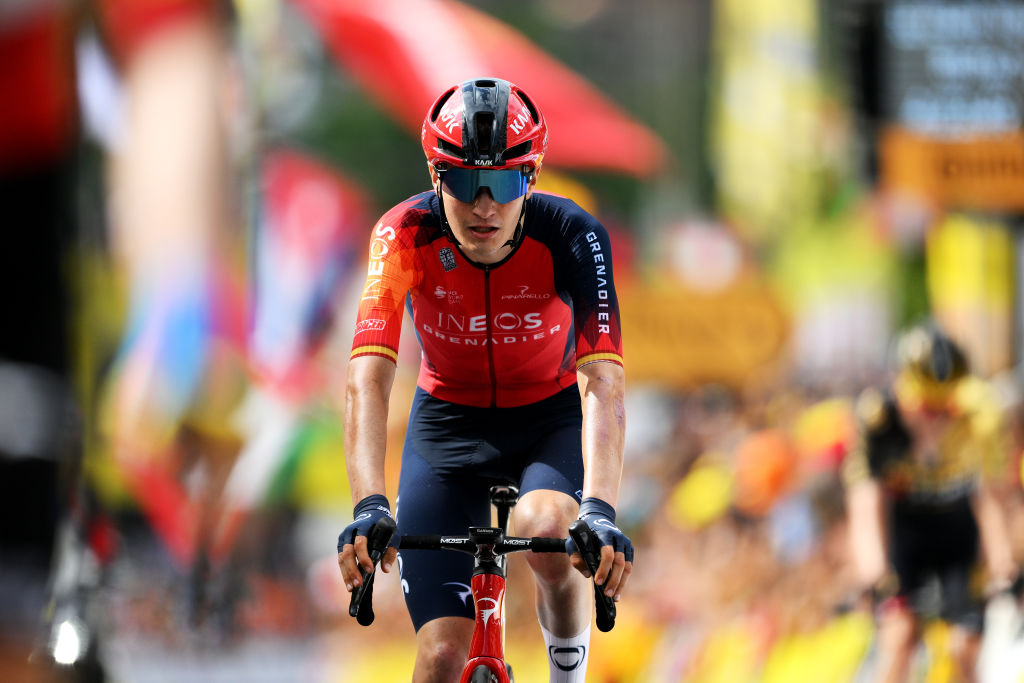Carlos Rodriguez: ‘The 2024 Vuelta a Espana’s final time trial makes it exciting all the way to Madrid'
Spanish rider motivated by tough mountain stage through home region of Granada

The inclusion of a final-stage time trial in the 2024 Vuelta a España guarantees excitement until the very end, Carlos Rodríguez (Ineos Grenadiers) predicted after next year’s race route was presented in Madrid.
The Vuelta route is as mountainous as ever, with no less than nine summit finishes, but the inclusion of a 22-kilometre individual time trial through the streets of the Spanish capital on the final Sunday is arguably the most eye-catching innovation of the 2024 race route.
“It’ll be something very different,” Rodriguez said. “It will keep the tension and emotion high to the last day, assuming the gaps on GC are not overly big.”
Rodríguez finished seventh at the Vuelta in 2022 and fifth on his Tour de France debut in 2023, confirming him as one of Spain's best Grand Tour talents. He said his decision regarding a return to his home Grand Tour in 2024 would have to wait until he had completed the Tour de France.
Rodríguez was at the glitzy Madrid presentation to commentate on the Vuelta route and pointed out that “the route has a lot of very difficult mountain days and the summit finishes are all tough enough to create gaps."
Rodríguez pointed to stage 9 as one of those tougher days that were particularly motivating on a personal level: it starts in the coastal city of Motril, just a handful of kilometres away from his home town of Almuñecar and includes a double ascent of the ultra-difficult ascent of Hazallanas in the foothills of Sierra Nevada before finishing in Granada, the regional capital.
“Mouthwatering,” was how he described it.
Breakaway specialist Jesús Herrada (Cofidis) liked the route too.
Get The Leadout Newsletter
The latest race content, interviews, features, reviews and expert buying guides, direct to your inbox!
“There are lots of opportunities for riders like me,” said the only Spanish rider to win a Vuelta stage last year.
“It’s true that the route will miss out a lot of parts of Spain, too. It’s very mountainous with a lot of new climbing stages, and that second last day” - stage 20 to Picón Blanco - “looks exceptionally hard.”
Not a GC rider himself, Herrada pointed to Jumbo-Visma, who scooped all top three podium spots last year and who are planning on sending defending champion Sepp Kuss next September to the Vuelta, as the collective favourites for 2024.
However, he also warned that Remco Evenepoel (Soudal-QuickStep) - should the 2022 winner return to the Vuelta for a third straight year - could also be a major threat overall.
UAE Team Emirates manager Joxean Fernández Matxin argued that the Vuelta’s second last day was so hard that it might well prove all but decisive.
“The last mountain stage is brutal, we could be looking at 5,000 metres of vertical climbing. I know that area really well, and it could change the entire race," he told Spanish specialist website Ciclo21.
“Combining the second rest day with two mountain stages” - to Cuitu Negru on stage 15 on the Sunday of the second week and Lagos de Covadonga on stage 16 as the opening day of the third - as well as Picón Blanco will make for a very difficult finale.”
“But I think stage 20 will decide more than anything else and stage 21’s time trial will simply consolidate what’s happened the day before.”
Regardless of how the GC favourites handle the Madrid time trial, for riders like Jesus Herrada with no overall goals, swapping over the traditional bunch sprint stage for a race against the clock on the last day is very welcome.
“In terms of your physical effort, it’s much easier. The usual format for stage 21 makes for a really fast finale, and if you’re in the back half of the peloton, you suffer,” the former Spanish National Road Champion and triple Vuelta stage winner said.
“But if the overall hasn’t been decided by that point, the guys who are up there on the GC will have to grit their teeth in the TT and make one last big effort in Madrid.”
Alasdair Fotheringham has been reporting on cycling since 1991. He has covered every Tour de France since 1992 bar one, as well as numerous other bike races of all shapes and sizes, ranging from the Olympic Games in 2008 to the now sadly defunct Subida a Urkiola hill climb in Spain. As well as working for Cyclingnews, he has also written for The Independent, The Guardian, ProCycling, The Express and Reuters.
